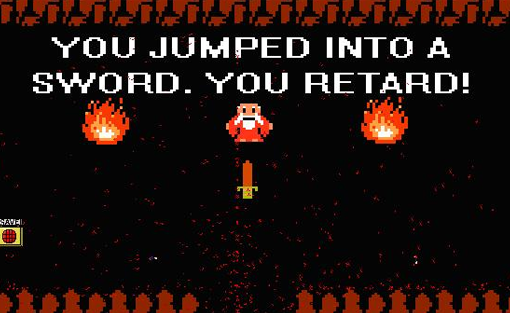This is partly a response to Brent Powell’s article “The Illusion of Challenge” and partly a open letter of sorts to anyone who is willing to listen.
There is a trend in the gaming media of bashing games with any kind of learning curve. If a game requires the player to try and fail a few times before they understand the mechanics, the gaming media will most often label it as “too hard” for the average gamer.
One of the common arguments for this kind of behaviour is that games should “cater to everyone” by being easy enough for everybody to finish. The idea is that if everybody can finish it, then everybody can enjoy it. While this sounds good on paper, it has a few problems.
For example it completely cuts out the group of gamers who like a stiff challenge, the people who love the tension of a series of difficult platforming sections or the thrill of finally beating a boss that has been taunting you for several hours. I think most people can relate to that feeling on some level.
Another problem with this approach is that it assumes that it’s audience can’t handle and don’t want a difficulty curve that forces them to do new things. Developers are creating 12 hour adventures with actual content lasting about three hours and the rest being repetition. I think developers – gamers and journalists, too! – should give the average gamer more credit.
The real reason people dislike difficult games is that most difficult games are difficult for the wrong reason. A lot of them are difficult in truly broken ways, like the “classic” Cheetahmen or more modern examples like Mirror’s Edge and the recent Bionic Commando. The former’s deaths by poor ledge detection and the latter’s death by radiation poisoning in areas where the game isn’t showing you any radiation doesn’t count as a challenge.
Even games that aren’t downright broken tend to focus on the wrong kind of challenges. Adding more enemies, increasing their health or damage does not count as an interesting challenge. Giving an enemy a new attack that forces you to stay on relative range and use safe, long range attacks, only moving in for the big strikes when the enemy is vulnerable? Much better.
This is also where difficulty settings in most games fail. You have one or maybe two difficulty settings that feel somewhat well paced, but anything below that and enemies die so easily you don’t feel like you’re making a difference and anything above becomes a big huge grind.
There is a relatively silent audience for extremely difficult games, as evidenced by the existence and popularity of games like I Wanna Be The Guy and La Mulana. This is an audience that is willing to withstand getting killed time and time again, in intentionally frustrating ways, just to tap into the rush you get from overcoming the stiff challenge. These people do not specifically like the frustration, but they can stand it.
VVVVVV is a platformer by indie developer Terry Cavanagh. It puts a few interesting spins on traditional platforming and much has been said about it’s wonderful presentation but the part I’m most interested in is how it manages to completely avoid frustrating the player while still being challenging.
The two primary ways that VVVVVV goes about achieving this is the self-explanatory level design – it’s never unclear what you’re supposed to do – and the brilliant use of checkpoints. When you die – and you will die – respawning takes as little as a second and you never feel punished. There’s hardly a single screen without a deadly obstacle, and few without a checkpoint. Once you’ve passed an obstacle, you touch the next checkpoint and will never be forced to go back just because you failed the next one.
Of course, the amazing presentation, great difficulty curve, minimalist story, fast pacing or free-roaming elements doesn’t hurt either and all in all VVVVVV is a great game that everyone should at least try, and hopefully buy.
Fortunately, not all developers are oblivious to the challenge-loving crowd. Demon’s Souls for example surprised nearly everyone when it showed up in the US and sold well even though it’s relentlessly challenging and not nearly as forgiving as VVVVVV. Another example would be the recently released Limbo which from what I hear adopts the same system of giving you as many checkpoints as it presents ways to kill you.
In the end, what I’m trying to argue is not that all games should be like VVVVVV and push challenge as one of it’s main features, but I do think more games should dare to push their players to do new things and try new strategies. Challenge may not be the only way to create emotional investment, but with storytelling in games being what it is, gaming can not afford to waste it.
After all, just as there is no room or need for every movie made to be a Die Hard or Transformers, not every game has to or should be a Halo or Modern Warfare.

I think the best example of a difficult game that is also fair is God Hand for the PS2. The game never cheats against you and you only get punished if YOU make a mistake.